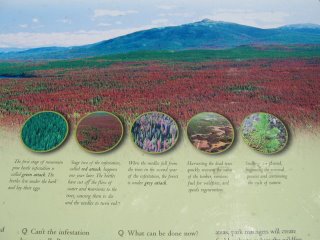I did an interview with the Prince George Citizen the other day on my way through. Can't find the article on the web but did find this excellent opinion piece by a former BC cabinet minister and current councillor:
Thursday, July 6, 2006
It’s all about the crude, dude
This week Prince George broke high-temperature records that are just about as old as I am. And that’s old, even for a record. In the past 10 years we’ve lost billions in merchantable timber revenues because we haven’t had a good pine-beetle-killing fall frost since 1985.
Does anyone have any doubts about global warming? Look at those red hills and scalped landscapes. Global warming and its affects are here and here to stay.
Scientists – including my opinion-page colleague Todd Whitcombe – tell us global warming is the result of excessive atmospheric carbon dioxide, a condition caused by burning fuels, which includes everything from fossil fuels to biomass to a dried cow flap.
Clearly, to reduce global warming, we must reduce our dependency on burning carbon-based fuels.
A simple, and I trust correct conclusion, yet one that boggles the mind in term of process. How does a country like Canada bring about a massive change in global energy policy, enough at least to reverse the current trend of increased global warming?
I believe we can reduce atmospheric global warming. It won’t be easy or popular, but Canada can play a major role on the world stage of climate control.
By way of a beginning, we know we have excess global carbon dioxide production because fuels are readily available, and until not too long ago, readily available at a reasonable cost.
This evidence would argue the “reasonable cost” factor is the culprit in global warming. Indeed, for far too long, the industrialized world has over utilized fossil fuels, which we now know, is an under-priced atmospheric contaminant.
The result for us, those red trees and sawed-off stumps that now characterize Prince George. For the world, the frequency of increasingly severe storm damage, rising ocean levels, decreasing polar caps and receding glaciers.
The answer then becomes one of increasing the cost of the contaminant. Cost avoidance is at the heart of every economy so let’s look at a couple of energy pricing factors.
Currently, a barrel of crude on the world market is priced at $73 US. Forecasters are predicting a price of $80 US a barrel if another damaging hurricane season hits the U.S. Gulf Coast. World events such as political instability following the Mexican elections, the North Korean nuclear threat, or more Middle East unrest could cause crude prices to jump again to $100 a barrel.
The United States gets 18 per cent of its crude oil supply from Canada; in fact we are the largest supplier of crude to the American market and the U.S. is responsible for 25 per cent of the world’s consumption of oil.
I would suggest a crude oil price hike of 10 per cent over world price for all export Canadian crude. A massive wake-up call to the U.S., but serious notice to all that the war on global warming must be won.
There is no second prize. Our so-called industrial success is killing the planet.
A Canadian petroleum export tax would drive Alberta Premier Ralph Klein around the bend, and the U.S. would grumble about the unfriendly nature of such an act, but that’s tough. With the U.S. dependence on 18 per cent of Canadian crude, we’ve got them by the nozzles. There is no way they can replace 18 per cent of their crude supply from any other source.
But, a Canadian export petro-tax would force American consumers to reduce their use of fossil fuels and their subsequent contribution to global warming. And I believe Americans are smarter then their government when it comes to the reality of global warming accompanied by economic reality.
For example, in business news, the leading auto sales company in the U.S. for the first half of 2006 was Toyota. According to the story, it’s due to sales of the compact Corolla model and Toyota’s expanding line of gas/electric hybrids.
Toyota has convinced a lot of American car buyers that it’s smart to be green. Especially with gas in the U.S. hovering around $3 a gallon. Imagine the U.S. move to petroleum conservation if gas went to $4 a gallon. By the way, at $1.10 Canadian a litre, we’re paying around $4.18 Cdn a U.S. gallon. Think this one through, and our Canadian petroleum industry, aided and abetted by national export tax policy, is giving away a depleting resource to a wasteful economy that in turn is devastating our Canadian environment.
There’s something decidedly and deadly wrong with this picture.
Bruce Strachan is a former B.C. cabinet minister and Prince George city councillor. His column appears Thursdays. E-mail: brucestrachan1@shaw.ca
©Copyright 2006 Prince George Citizen












 was hard to get pictures of the pine beetle infestation, as it was very hazy. Here's one. I would estimate that about a third of the lodgepole pine trees in some areas are visibly affected. And that doesn't mean that the others aren't. Diseased trees may still be green one year, and won't turn "red" until the following year. Then they turn grey and their needles start to fall to the ground.
was hard to get pictures of the pine beetle infestation, as it was very hazy. Here's one. I would estimate that about a third of the lodgepole pine trees in some areas are visibly affected. And that doesn't mean that the others aren't. Diseased trees may still be green one year, and won't turn "red" until the following year. Then they turn grey and their needles start to fall to the ground.
